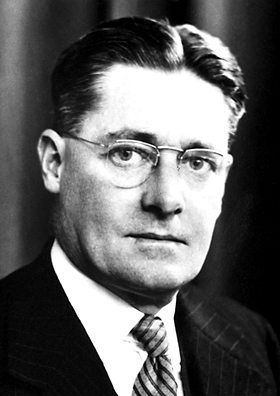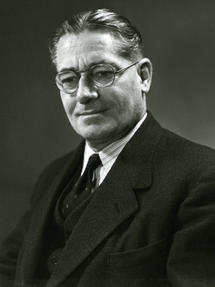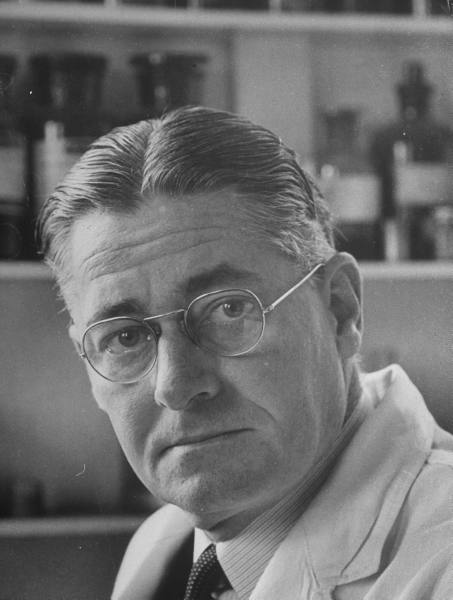<Back to Index>
- Physician Howard Walter Florey, 1898
- Writer Cyprian Kamil Norwid, 1821
- Chairman of the Presidium of the Supreme Soviet Konstantin Ustinovich Chernenko, 1911
PAGE SPONSOR



Howard Walter Florey, Baron Florey OM FRS (24 September 1898 – 21 February 1968) was an Australian pharmacologist and pathologist who shared the Nobel Prize in Physiology or Medicine in 1945 with Sir Ernst Boris Chain and Sir Alexander Fleming for his role in the extraction of penicillin. Florey's discoveries are estimated to have saved over 80 million lives, worldwide. Florey is regarded by the Australian scientific and medical community as one of its greatest scientists. Sir Robert Menzies, Australia's longest serving Prime Minister, said that "in terms of world well being, Florey was the most important man ever born in Australia".
Born the youngest of five children in Adelaide, South Australia, Howard Florey was educated at St Peter's College, Adelaide, where he was a brilliant student and junior sportsman. He studied medicine at the University of Adelaide from 1917 to 1921. At the university he met Ethel Reed, another medical student, who became both his wife and his research colleague. A Rhodes Scholar, he continued his studies at Magdalen College, Oxford, receiving the degrees of BA and MA. In 1926 he was elected to a fellowship at Gonville and Caius College, Cambridge, and a year later he received the degree of PhD from the University of Cambridge.
After periods in the United States and at Cambridge, he was appointed to the Joseph Hunter Chair of Pathology at the University of Sheffield in 1931. In 1935 he returned to Oxford, as Professor of Pathology and Fellow of Lincoln College, leading a team of researchers. In 1938, working with Ernst Boris Chain and Norman Heatley, he read Alexander Fleming's paper discussing the antibacterial effects of Penicillium notatum mould. He mass produced this mould for the injections of the soldiers of World War II who suffered from infections.
In 1941, they treated their first patient, Albert Alexander, who had been scratched by a rose thorn. His whole face, eyes, scalp were swollen, and he had an eye removed to relieve some of the pain. Within a day of being given penicillin, he started recovering. However they did not have enough penicillin to help him to full recovery, he relapsed, and died. Because of this experience, they changed their focus to children, who did not need such large quantities of penicillin.
Florey's research team investigated the large scale production of the mould and efficient extraction of the active ingredient, succeeding to the point where, by 1945, penicillin production was an industrial process for the Allies in World War II. However, Florey held that the project was originally driven by scientific interests, and that the medicinal discovery was a bonus:
People sometimes think that I and the others worked on penicillin because we were interested in suffering humanity. I don't think it ever crossed our minds about suffering humanity. This was an interesting scientific exercise, and because it was of some use in medicine is very gratifying, but this was not the reason that we started working on it.
Developing penicillin was a team effort, as these things tend to be—Howard Florey, Baron Florey
Florey shared the Nobel Prize in Physiology or Medicine in 1945 with Ernst Boris Chain and Alexander Fleming. Fleming first observed the antibiotic properties of the mould that makes penicillin, but it was Chain and Florey who developed it into a useful treatment.
He was openly concerned about the population explosion resulting from improving healthcare, and was a staunch believer in contraception.
After
the death of his wife Ethel, he married his long time colleague and
research assistant Dr. Margaret Jennings in 1967. He died of a heart attack in 1968 and was honoured with a memorial service at Westminster Abbey, London. Florey was appointed a Knight Bachelor in 1944. He was awarded the Lister Medal in 1945 for his contributions to surgical science. The corresponding Lister Oration, given at the Royal College of Surgeons of England later that year, was titled "Use of Micro - organisms for Therapeutic Purposes". Florey was elected president of the Royal Society in 1959. In 1962, Florey became Provost of The Queen's College, Oxford.
During his term as Provost, the college built a new accommodation
block, named the Florey Building in his honour. The building was
designed by the British architect Sir James Stirling. He was made a life peer in 1965 as Baron Florey, of Adelaide in the State of South Australia and Commonwealth of Australia and of Marston in the County of Oxford.
This was a higher honour than the knighthood awarded to penicillin's
discoverer, Sir Alexander Fleming, and it recognised the monumental
work Florey did in making penicillin available in sufficient quantities
to save millions of lives in the war, despite Fleming's doubts that
this was feasible. Florey was Chancellor of the Australian National University from
1965 until his death in 1968. The lecture theater at the John Curtin
School of Medical Research was named for him during his tenure at the Australian National University. Florey's portrait appeared on the Australian $50 note for 22 years (1973 – 95), and the suburb of Florey in the national capital Canberra is named after him. The Howard Florey Institute, located at the University of Melbourne, and the largest lecture theatre in the University of Adelaide's
medical school are also named after him. In 2006, the federal
government of Australia renamed the Australian Student Prize, given to
outstanding high school leavers, the "Lord Florey Student Prize", in
recognition of Florey. The Florey Unit of the Royal Berkshire Hospital, Reading, Berkshire is named after him. The "Lord Florey Chair" in the Faculty of Medicine at the University of Sheffield is named in his honour.